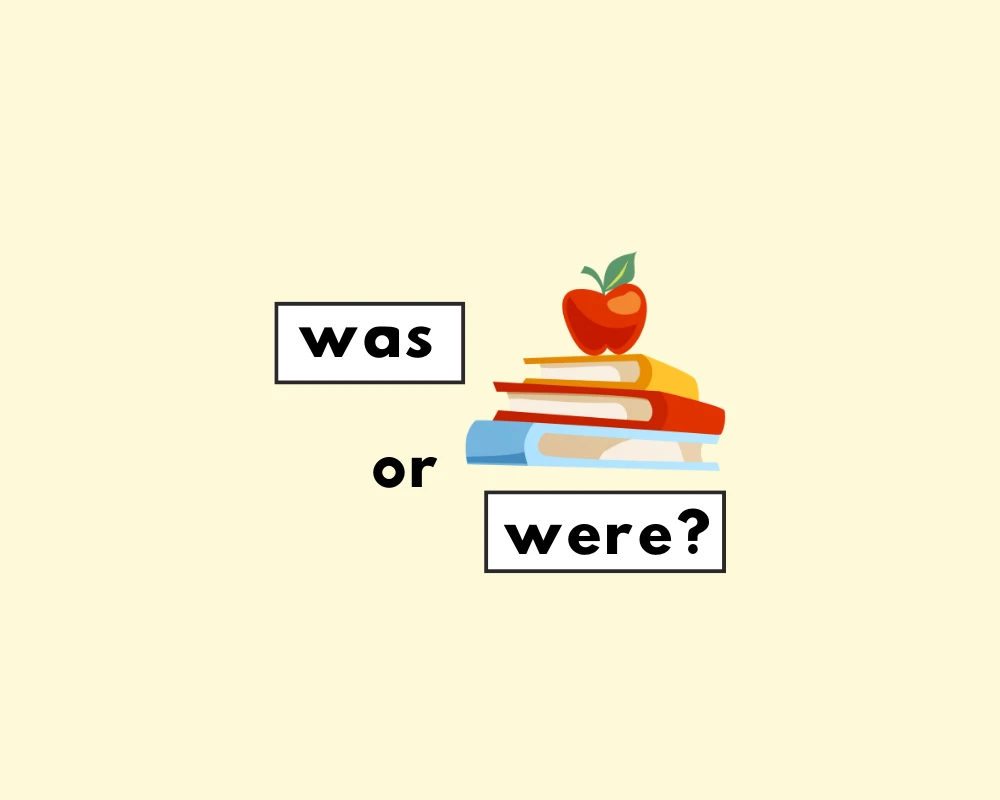When to use “was” and “were”
Did you know that were and was are actually the same word but with different forms? It’s true, were and was are both past tense forms of the highly irregular verb, ‘to be‘.
The weather was perfect yesterday.
The children were playing outside.
The book were on the table.
Our friends was coming over for dinner.
The difference between were and was and when to use which has to do with count: is the subject referenced singular or plural? If the subject is singular, chances are the correct word is was. On the other hand, if the subject is plural, then we use were. See these sentences that show the difference:
Sentence examples with was and were
He was happy yesterday.
They were at the party last night.
She was tired after the long journey.
We were excited to hear the news.
It was a beautiful day.
How do you know whether to use was or were?
As we can see from the sentence examples above, single subjects use ”was” in the past tense: ‘he was happy’, ‘she was tired’, and ‘it was a beautiful day’. He, she and it are all singular subjects, and so in the past tense they use ‘was‘. Plural subjects, such as we, they, them and second-person singular, you, use ”were” in the past tense.
Rule: first-person and third-person singular subjects in the past tense use ‘was‘ (e.g., He was happy it rained). Plural subjects and second-person singular subjects use ‘were’ in the past tense (e.g., They were sad at hearing the news.)
As a broad rule of thumb, this is the general distinction between knowing when to use ‘was‘ and ‘were‘. That said, there are cases that come up in English that prove as exceptions to the rule, and that is when we communicate in the subjunctive mood.
What is the subjunctive mood in grammar?
According to Merriam-Webster, the subjunctive mood expresses, “wishes, proposals, suggestions, or imagined situations, as in “I wish I could look at that fabulous cat all day.”
The past subjunctive comes into play when we speak in hypothetical and counter-factual situations. For example, when we entertain things that are not true or are not the case, “if I were a rich man, I would build a big house”, we use the subjunctive mood, and we use ‘were‘ even when the subject is singular.
When to use was or were, associate ‘was’ (3 letters) with singular subjects (one) and ‘were’ (4 letters) with plural subjects (many).
When to use ‘If I was’ vs ‘if I were’?
If I were you, I would study harder for the test.
I wish I were taller.
I wish she were here to celebrate with us.
What do all of these sentences have in common? If you guessed that they are all written in the subjunctive mood and use ‘were‘ in the past subjunctive, then you guessed right! Each of these sentences describes something that is either untrue, hypothetical or some event that the subject ‘wishes’ were the case. When we describe things that we wish or hope were true, we use ‘were‘ even when the subject is singular.
Rule: when speaking in hypotheticals, or in the subjunctive mood to express a state that is not currently existent, use ‘were‘.
“Were” in the subjunctive mood
If he were president, he would implement significant reforms.
I wish it were easier to learn a new language.
It’s important that they were more careful in their actions.
If only it were possible to turn back time.
I wish they were more understanding of the situation.
“Was” in sentence examples
The book I was reading is a classic.
The concert was canceled due to the heavy rain.
The party last night was a lot of fun.
When I was younger, I loved to play video games.
The movie was amazing; I enjoyed every moment of it.
Keep on learning! It’s encouraged.
- Active vs. Passive Voice (Explained, With Examples)
- When to Use ‘Weren’t’ or ‘Wasn’t’? A Guide
- What’s Subject Verb Agreement? (Rules of Subject Verb Agreement)
- When to Use ‘A’ or ‘An’ (What’s an Article?)
- What is the Past Tense? (Forms of the Past Tense)
Work Sheet
According to the post, “was” and “were” are both past tense forms of which verb?
When should you generally use “was” according to the main rule in the post?
Which of these subjects, according to the post, typically uses “were” in the past tense?
The post notes that the subject “you” uses which form in the past tense?
What specific grammatical mood is mentioned in the post as an exception where “were” might be used even with a singular subject?
The weather perfect yesterday.
The children playing outside.
She tired after the long journey.
We excited to hear the news.
He happy yesterday.
Frequently Asked Questions
What are was and were?
+
When do you use was?
+
When do you use were?
+
What is the main rule for was/were?
+
Are there exceptions?
+
Yash, D. "When to Use Were or Was?." Grammarflex, Jun 15, 2025, https://www.grammarflex.com/is-it-if-i-were-or-if-i-was-when-to-use-were-vs-was/.
Sources
-
Merriam-Webster, “Getting in the Subjunctive Mood” Accessed on August 4, 2023.











